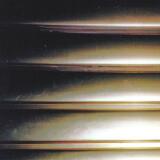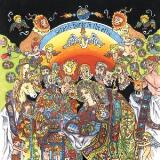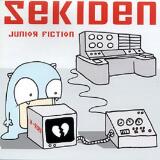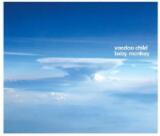4 Music Reviews
by dave heaton
Calla, self-titled (Arena Rock Recording Co)
 The NYC-based band Calla's 2002 album Televise found them pushing their intensely intimate, moody form of haunted-rock in a more conventionally "rock" direction (more tightly wrapped and explicitly melodic) than on their 2000 album Scavengers. Take a walk back to 1999 with the reissue of Calla's self-titled debut album, and you'll find that the band started off making even spookier, more abstract and open-ended music. The album is a mostly instrumental conjoining of near-silent soundscapes from the evil twin of Philip Glass and leftover feedback from Sonic Youth's Bad Moon Rising with the urban eccentricity of Swordfishtrombones-era Tom Waits and some dark, ripped-out-of-the-soul blues from another planet. Calla isn't as emotionally overpowering as their later albums...or, I should more fairly say, it doesn't hit you in the same part of your body but is just as overpowering. Instead of feeling the hurt of loneliness and betrayal in the deepest part of your gut, you feel like you're floating in darkness but someone could grab you at any time. Like all of Calla's albums, this one has a concentrated sense of beauty, mystery, and eeriness that is hard to describe. By far the most obviously experimental of the three albums (though the innovation inherent in even their most 'rock and roll' songs shouldn't be overlooked), Calla is important not just as a "see where they were before" document but as an ambitious work with a singular atmosphere of terror and beauty; it's a trip into a state of apocalyptic calm, a step into a few lost seconds of time where 1999 really did bring the end of the universe.
The NYC-based band Calla's 2002 album Televise found them pushing their intensely intimate, moody form of haunted-rock in a more conventionally "rock" direction (more tightly wrapped and explicitly melodic) than on their 2000 album Scavengers. Take a walk back to 1999 with the reissue of Calla's self-titled debut album, and you'll find that the band started off making even spookier, more abstract and open-ended music. The album is a mostly instrumental conjoining of near-silent soundscapes from the evil twin of Philip Glass and leftover feedback from Sonic Youth's Bad Moon Rising with the urban eccentricity of Swordfishtrombones-era Tom Waits and some dark, ripped-out-of-the-soul blues from another planet. Calla isn't as emotionally overpowering as their later albums...or, I should more fairly say, it doesn't hit you in the same part of your body but is just as overpowering. Instead of feeling the hurt of loneliness and betrayal in the deepest part of your gut, you feel like you're floating in darkness but someone could grab you at any time. Like all of Calla's albums, this one has a concentrated sense of beauty, mystery, and eeriness that is hard to describe. By far the most obviously experimental of the three albums (though the innovation inherent in even their most 'rock and roll' songs shouldn't be overlooked), Calla is important not just as a "see where they were before" document but as an ambitious work with a singular atmosphere of terror and beauty; it's a trip into a state of apocalyptic calm, a step into a few lost seconds of time where 1999 really did bring the end of the universe.
Of Montreal, Satanic Panic in the Attic (Polyvinyl)
 Of Montreal's sixth album Satanic Panic in the Attic is this year's Dear Catastrophe Waitress, a brillant reinvention that on first listen is quite a shock, though subsequent listens reveal it to be less a sea change than a natural evolutionary step, albeit one that has transformed them into a more complex and sophisticated band than ever before. The band's last album, 2002's Aldhils Arboretum, had them moving away from the overt theatricality of their previous two albums, towards more compact rock/pop songs that retained the group's 60-ish melodies and their general taste for noncomformity and oddball artistic impulses. Satanic Panic in the Attic takes off from the foundation which that album built, with a bigger, more confident sound and a diverse songwriting approach that takes in a variety of genres and styles - electro-pop, power-pop, psychedelic folk, African pop music, Kraut-rock, funk - in an effortless way without letting them take over the band's basic personality. They're letting themselves show off their musical chops (check out the guitar licks and attention-getting bass lines, especially) and indulge in whimsy (listen to the acapella section of "Lysergic Bliss" or the British-isms they dip into at the end of "My British Tour Diary") while sounding more energetic than ever. Satanic Panic... might be the most amibitious album yet by a band full of creative ambition...yet it's also almost definitely their most accessible, an adventure ride that's also one hell of a great pop album.
Of Montreal's sixth album Satanic Panic in the Attic is this year's Dear Catastrophe Waitress, a brillant reinvention that on first listen is quite a shock, though subsequent listens reveal it to be less a sea change than a natural evolutionary step, albeit one that has transformed them into a more complex and sophisticated band than ever before. The band's last album, 2002's Aldhils Arboretum, had them moving away from the overt theatricality of their previous two albums, towards more compact rock/pop songs that retained the group's 60-ish melodies and their general taste for noncomformity and oddball artistic impulses. Satanic Panic in the Attic takes off from the foundation which that album built, with a bigger, more confident sound and a diverse songwriting approach that takes in a variety of genres and styles - electro-pop, power-pop, psychedelic folk, African pop music, Kraut-rock, funk - in an effortless way without letting them take over the band's basic personality. They're letting themselves show off their musical chops (check out the guitar licks and attention-getting bass lines, especially) and indulge in whimsy (listen to the acapella section of "Lysergic Bliss" or the British-isms they dip into at the end of "My British Tour Diary") while sounding more energetic than ever. Satanic Panic... might be the most amibitious album yet by a band full of creative ambition...yet it's also almost definitely their most accessible, an adventure ride that's also one hell of a great pop album.
Sekiden, Junior Fiction (Boompa/Microindie)
 The Australian band Sekiden likes to sing about robots and computers and play around with synthesizers, but when it comes right down to it, they're mainly interested in playing catchy power-pop anthems. Their debut full-length Junior Fiction is filled with guitar crunch and stick-in-your-head hooks, augmented by some New Wave keyboards and the sweet promise of a brand new crush. Though for brief moments they'll dip into Casio-laden dream-pop, for the most part they're all about rocking their sweet melodies into your head (not counting the 40 minutes of electronic bleeps that round out the album's final track, "Pulsewidth"). "It was the first day of my life/you were in my eyes," lead vocalist/guitarist Simon sings at the start of the first track, and he sings throughout the album like he's in that joyous moment. Lyrically Sekiden's not all about sunshine, though; there's always some melancholy lurking around, as there should be. But musically they kick us around like every day's going to be brighter than the one before - recalling at various times The Cars, Redd Kross, Weezer, and Imperial Teen, Sekiden hit us up with fabulous melodies, a futuristic sense of style, and a punch, leaving us with several would-be hit anthems that we'll let pogo around our heads for a long time to come.
The Australian band Sekiden likes to sing about robots and computers and play around with synthesizers, but when it comes right down to it, they're mainly interested in playing catchy power-pop anthems. Their debut full-length Junior Fiction is filled with guitar crunch and stick-in-your-head hooks, augmented by some New Wave keyboards and the sweet promise of a brand new crush. Though for brief moments they'll dip into Casio-laden dream-pop, for the most part they're all about rocking their sweet melodies into your head (not counting the 40 minutes of electronic bleeps that round out the album's final track, "Pulsewidth"). "It was the first day of my life/you were in my eyes," lead vocalist/guitarist Simon sings at the start of the first track, and he sings throughout the album like he's in that joyous moment. Lyrically Sekiden's not all about sunshine, though; there's always some melancholy lurking around, as there should be. But musically they kick us around like every day's going to be brighter than the one before - recalling at various times The Cars, Redd Kross, Weezer, and Imperial Teen, Sekiden hit us up with fabulous melodies, a futuristic sense of style, and a punch, leaving us with several would-be hit anthems that we'll let pogo around our heads for a long time to come.
Voodoo Child, Baby Monkey (V2)
 In 1997, Moby released a gorgeous album of ambient electronic music called The End of Everything, under the pseudonym Voodoo Child. With Baby Monkey, he demonstrates that Voodoo Child doesn't have a cohesive musical personality of its own, but is rather a name he uses whenever he wants to release music outside of the expectations and commercial constraints that a Moby album might have. That sleight-of-hand is both disappointing and understandable. It's a shame he feels the need to differentiate between his "commercial" albums and those he does just for the love of it, yet he's right that if Baby Monkey was billed as 'the new album from Moby', the reaction from fans and critics would be harsher. By saying "oh, this is just something I'm doing on the side," he won't be judged for how fresh the music sounds. And in this case, the music isn't particular fresh, though it is quite enjoyable. As Moby describes it, Baby Monkey is his attempt at making "a straightforward, underground, electronic dance record," inspired by nights out clubbing during a European tour. In other words, this is an exercise in genre, a 12-track stab at making the sort of loud, streamlined, simple-yet-lovely music you might lose yourself in while on the dancefloor. As such it's an album that's both retro (the style is very reminicscent of techno from a decade or more ago) and of the now (in the sense that this type of music is all about getting wrapped up in a certain feeling). And it works wondrously on that level, with booming bass, relentless rhythms, and perfect minimalist textures - a piano melody here, some strings there. Baby Monkey isn't pushing anything forward, isn't breaking new ground, but it sounds absolutely great. It has a cool energy and zen-like simplicity that would make it the perfect album for the dance floor, the highway or for just being.
In 1997, Moby released a gorgeous album of ambient electronic music called The End of Everything, under the pseudonym Voodoo Child. With Baby Monkey, he demonstrates that Voodoo Child doesn't have a cohesive musical personality of its own, but is rather a name he uses whenever he wants to release music outside of the expectations and commercial constraints that a Moby album might have. That sleight-of-hand is both disappointing and understandable. It's a shame he feels the need to differentiate between his "commercial" albums and those he does just for the love of it, yet he's right that if Baby Monkey was billed as 'the new album from Moby', the reaction from fans and critics would be harsher. By saying "oh, this is just something I'm doing on the side," he won't be judged for how fresh the music sounds. And in this case, the music isn't particular fresh, though it is quite enjoyable. As Moby describes it, Baby Monkey is his attempt at making "a straightforward, underground, electronic dance record," inspired by nights out clubbing during a European tour. In other words, this is an exercise in genre, a 12-track stab at making the sort of loud, streamlined, simple-yet-lovely music you might lose yourself in while on the dancefloor. As such it's an album that's both retro (the style is very reminicscent of techno from a decade or more ago) and of the now (in the sense that this type of music is all about getting wrapped up in a certain feeling). And it works wondrously on that level, with booming bass, relentless rhythms, and perfect minimalist textures - a piano melody here, some strings there. Baby Monkey isn't pushing anything forward, isn't breaking new ground, but it sounds absolutely great. It has a cool energy and zen-like simplicity that would make it the perfect album for the dance floor, the highway or for just being.
Copyright (c) 2005 erasing clouds |
|